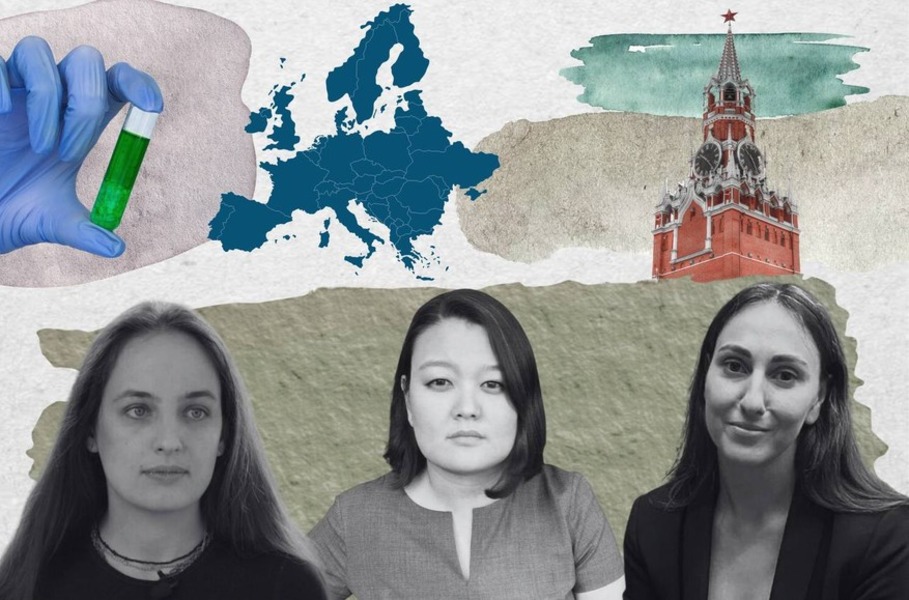Elena Kostyuchenko, Natalia Arno, and Irina Babloyan, have long worked to expose the Kremlin’s lies. While traveling through Europe in the last year, each was poisoned by unknown toxins. Their cases remain unsolved, Informs The Insider. Why?
“You cannot return to Russia. You will be killed here.”
Dmitry Muratov, the editor-in-chief of Novaya Gazeta, didn’ not explain how he came to this dire conclusion, but he said he wasn’t taking any chances. His foreign correspondent, Elena Kostyuchenko, who had documented Russian war crimes in occupied Ukraine, had already been warned that she was in danger and he advised her to stay in Europe. Muratov was right.
Six months later, Kostyuchenko would find herself suffering from an acute pain in her abdomen, insomnia, nausea and an extreme case of anxiety. Her face, fingers and toes swelled; her palms turned red and ballooned in size before returning to normal. Something was seriously wrong with her but she didn’t know what.
Kostyuchenko was very likely poisoned.
That, at least, is the conclusion of a half dozen doctors, scientists and chemical weapons experts whom The Insider has consulted about her case, which has not been publicized until now. And Kostyuchenko isn’t the only suspected poison victim. She is part of a trio of muckraking Russian journalists and dissidents — all of them women, all outspoken critics of Vladimir Putin’s regime, and all living and working in different countries outside of Russia — who in the past year have succumbed to a similar set of strange and alarming physical ailments, with circumstantial evidence suggesting foul play. They’ve found their hotel doors mysteriously prised open, unusual smells lingering in the air of their living quarters, or emanating from their own bodies, as well as meals they’ve eaten utterly lacking in taste. The European and American authorities these women have relied on for answers have been unable (or unwilling) to do so.
Their unsolved cases, which have all begun after Russia’s full-scale invasion of Ukraine on February 24, 2022, follow series of uncannily similar poisonings of other enemies of the Kremlin over the past decade with targets as diverse as Emilian Gebrev, a Bulgarian arms dealer; Sergei Skripal, a British spy who years earlier defected from the GRU, Russia’s military intelligence agency; Alexei Navalny and Vladimir Kara-Murza, Russian opposition figures who canvassed and agitated extensively around Russia. These poisonings, as The Insider was the first new outlet to determine, were conducted with the military-grade nerve agent Novichok and perpetrated by operatives from the Russian special services.
***
To hear the 36 year-old Kostyuchenko tell it, her story begins on March 28, 2022, the day Novaya Gazeta, one of the last remaining (at least partly) independent news outlets in Russia, published a dispatch from occupied Kherson about the torture and kidnapping of Ukrainian civilians at the hands of Russian soldiers: her subjects were handicuffed to radiators and beaten with rifle butts, their children dragged away with bags over their heads. Two days after her story was published, Novaya Gazeta, founded in 1993, decided to close up shop after receiving a second notice issued to it by Russia’s Federal Service for Supervision of Communications, Information Technology and Mass Media, Roskomnadzor. Two notices from this bureaucracy usually indicate that a criminal proceeding is imminent. Given the Russian penalty for spreading “disinformation” about the war in Ukraine — which basically amounts to telling the truth about it — is up to 25 years in prison, Muratov preemptively “suspended” the newspaper whose pathfinding investigative reporting won him a Nobel Peace Prize in 2021. A total of seven Novaya Gazeta journalists, among them Anna Politkovskaya, Yuri Shchekochikhin, and Anastasia Baburova, have been murdered over the years for their investigative spadework.
The shuttering of her newspaper did not deter Kostyuchenko.

